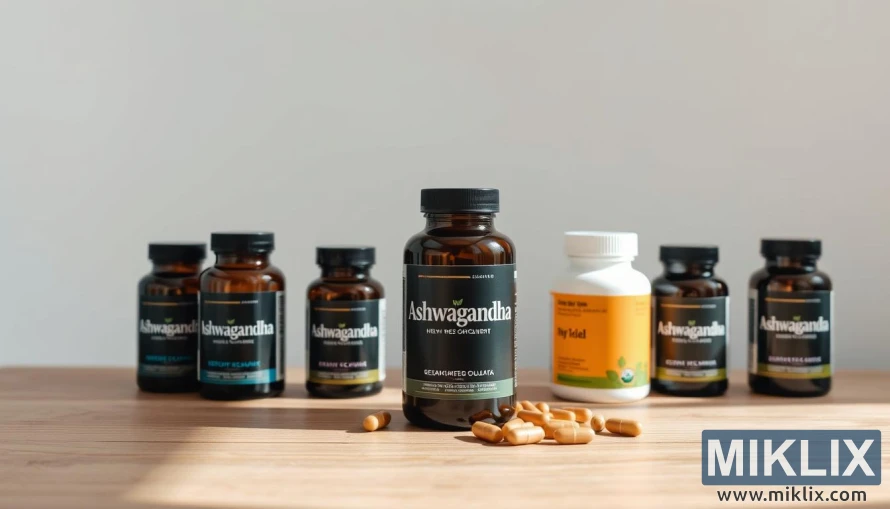Unlock Calm and Vitality: How Ashwagandha Enhances Mind, Body, and Mood
Published: June 28, 2025 at 10:36:05 PM UTC
Ashwagandha has become increasingly popular for its health benefits. It's a key component in Ayurvedic medicine, known for its natural stress relief, athletic performance enhancement, and mental health benefits. Studies show that ashwagandha's active compounds offer a range of health advantages. This article explores the remarkable benefits of ashwagandha, backed by historical and modern research.

Key Takeaways
- Ashwagandha supplements provide natural stress relief and anxiety reduction.
- These supplements are linked to enhanced athletic performance and recovery.
- Ashwagandha supports various aspects of mental health.
- Regular consumption of ashwagandha may help regulate blood sugar levels.
- The herb is known for its anti-inflammatory properties.
- Ashwagandha can improve sleep quality and cognitive function.
Introduction to Ashwagandha
Ashwagandha, scientifically known as Withania somnifera, is an evergreen shrub deeply valued in traditional Ayurvedic medicine. Its history spans thousands of years, celebrated for its adaptogenic properties. The term "adaptogen" describes substances that aid the body in adapting to stress and maintaining equilibrium. This is vital for promoting overall health and well-being.
The roots and leaves of ashwagandha are frequently used in various formulations, highlighting its versatility in Ayurvedic practices. As the interest in natural remedies escalates, ashwagandha has become increasingly popular in modern nutritional supplements. This surge mirrors a broader trend towards the use of adaptogenic herbs to combat daily stressors and boost resilience.
What is Ashwagandha?
Ashwagandha is a potent adaptogen with roots in ancient Indian medicine, celebrated for its wide-ranging health benefits. The name, derived from Sanskrit, translates to "smell of the horse." This refers to its unique scent and its traditional role in boosting strength and vitality. Known as “Indian ginseng” or “winter cherry,” it has been a cornerstone in traditional medicine for millennia, aiding in stress reduction and overall well-being.
This herb, native to India and parts of Southeast Asia, grows as a small shrub with yellow flowers. Its effectiveness is attributed to compounds like withanolides. These are key components found in ashwagandha, making it a popular choice among herbal supplements today.
How Ashwagandha Works
Exploring ashwagandha's mechanism of action reveals its profound benefits. It acts as an adaptogen, boosting the body's stress response. This interaction with the hypothalamic-pituitary-adrenal (HPA) axis is key to managing cortisol levels. By adjusting cortisol, ashwagandha aids in stress reduction and enhances mental well-being.
The pharmacology of ashwagandha showcases its interaction with biological pathways through phytochemicals. These compounds affect neurotransmitter regulation and inflammation. Ashwagandha's adaptogenic nature supports the body's resilience, promoting emotional balance.
Stress and Anxiety Reduction
Ashwagandha is recognized as a potent natural remedy for managing stress and anxiety. Its adaptogenic properties help lower stress levels and promote calmness. Research shows that those who use ashwagandha for stress relief see a significant drop in perceived stress and cortisol levels. Cortisol is the body's main stress hormone.
Studies reveal that individuals taking ashwagandha supplements experience lower anxiety scores than those on placebos. This indicates ashwagandha's role in anxiety management. It helps regulate the body's stress response, reducing stress hormones. This makes it an attractive option for those looking for natural solutions.
Key benefits of ashwagandha include:
- Reduction in cortisol levels
- Improved overall mood and well-being
- Enhanced coping mechanisms during stressful situations
- Support for mental clarity and focus
Adding ashwagandha to your daily routine can be a valuable strategy for tackling modern life's stress and anxiety.
Ashwagandha for Athletic Performance
Ashwagandha has become a favorite among athletes aiming to enhance their physical abilities. Studies suggest it may positively affect various aspects of exercise, making it an attractive choice for those seeking to boost their athletic performance.
Research indicates that ashwagandha can significantly improve muscle strength. Users often report increased muscle size, indicating its role in supporting fitness goals.
Further, ashwagandha may increase VO2 max, a key factor in cardiovascular endurance. This is essential for endurance sports athletes, as it affects oxygen consumption during activity. Higher VO2 max can enhance performance over longer distances, giving athletes a competitive advantage.
Ashwagandha also shows promise in improving endurance during intense workouts. It boosts stamina and reduces the feeling of exertion, allowing athletes to perform better during challenging sessions.
In conclusion, scientific evidence supports ashwagandha's role in athletic performance. Athletes seeking natural ways to improve strength, endurance, and overall exercise performance may find ashwagandha beneficial.
Mental Health Benefits of Ashwagandha
Ashwagandha has become a focus in mental health research. It may help manage depression. Studies show it can lower anxiety and boost mood, aiding those with mental health issues.
It also improves cognitive functions. This means better focus and attention, essential for daily tasks. These benefits make ashwagandha a natural choice for cognitive enhancement.

Research on ashwagandha's mental health benefits is ongoing. Yet, the existing data is promising. It suggests ashwagandha could be a valuable part of holistic mental health care. As research continues, it may offer hope for those seeking natural solutions.
Boosting Testosterone and Male Fertility
Ashwagandha, a potent adaptogen, has caught the eye of researchers in male reproductive health. Studies suggest it can boost testosterone levels significantly. For men dealing with fertility issues, ashwagandha offers more than just hormonal balance. It plays a key role in improving male fertility.
Research indicates that ashwagandha supplements can lead to:
- Increased testosterone production, boosting libido.
- Enhanced sperm quality, in motility and morphology.
- Reduction in oxidative stress, which harms reproductive health.
The evidence backing ashwagandha's role in reproductive health is strong. Many men have seen improvements in testosterone and sperm quality after adding ashwagandha to their diet. This ancient herb could be a natural ally for those aiming to boost their reproductive health.
Blood Sugar Regulation
Ashwagandha has caught the eye for its possible role in managing blood sugar levels, a key aspect of diabetes care. Research hints that it might boost insulin sensitivity, aiding in better glucose absorption by cells. This could be a game-changer for those aiming to keep their blood sugar stable.
Studies have delved into ashwagandha's antidiabetic properties. They show it can lower fasting blood glucose and fight insulin resistance. These findings suggest it could be a valuable addition to diabetes management plans.
Though research is in its early stages, the idea of ashwagandha aiding in blood sugar control is intriguing. Further studies are needed to fully understand its role in diabetes management. This could shed light on how ashwagandha can complement traditional treatments.
Anti-Inflammatory Benefits of Ashwagandha
Ashwagandha, a revered adaptogenic herb, showcases promising Ashwagandha anti-inflammatory effects that warrant attention. Research indicates that it contains several bioactive compounds, like withanolides, which may play a critical role in inflammation reduction. Studies demonstrate that these compounds can effectively lower inflammation-related markers such as C-reactive protein and cytokines.
Chronic inflammation is linked to numerous health issues, including autoimmune diseases, heart conditions, and certain cancers. The incorporation of Ashwagandha into one's diet may serve as a beneficial strategy for mitigating these risks:
- Reduction in joint inflammation
- Alleviation of muscle soreness
- Support in healing chronic inflammatory conditions
While preliminary findings highlight its promise, further rigorous studies are essential. They are needed to fully comprehend the mechanisms behind the Ashwagandha anti-inflammatory effects. This ensures its efficacy in treating inflammation-related disorders.

Ashwagandha and Cognitive Function
Ashwagandha is gaining attention for its cognitive benefits, including memory and attention enhancement. This ancient herb has shown promise in various studies. It improves cognitive tasks and reaction times, benefiting older adults and those with cognitive impairments.
Its ability to reduce stress may also contribute to these improvements. Lower anxiety levels can lead to better focus and clarity of thought. This makes ashwagandha a valuable addition to daily routines for cognitive support.
The antioxidant properties of ashwagandha are key to its brain health benefits. It combats oxidative stress, protecting against cellular damage. This can significantly impact cognitive performance. Studies suggest regular intake can lead to substantial memory enhancement.
Sleep Quality Enhancement
Ashwagandha has become a popular natural remedy for sleep improvement, mainly for those with insomnia. Studies show it can significantly enhance sleep quality. It reduces the time it takes to fall asleep, making it a good choice for insomnia sufferers.
Research backs up the claim that ashwagandha supplements improve sleep efficiency. Users often wake up feeling more refreshed. For those with sleep issues, ashwagandha offers a natural alternative to traditional sleep aids.
As an adaptogen, ashwagandha aids in managing stress and anxiety, common sleep disruptors. It helps the body cope with these stressors, leading to better sleep. This makes ashwagandha a valuable tool in the quest for quality sleep, appealing to those looking for an insomnia solution.
Dosage Recommendations for Ashwagandha
Finding the right Ashwagandha dosage is key to achieving the best results. Studies show that the effective dose can vary greatly, depending on individual needs and desired outcomes. Typically, a daily dose of 250 mg to 1,250 mg is suggested, based on the ashwagandha form and the intended benefits.
For newcomers to ashwagandha, starting with a lower dose can help build tolerance and gauge how well it works for you. Here are some guidelines on dosing:
- Begin with 250 mg to gauge tolerance.
- Gradually increase to a range of 500 mg to 1,000 mg for more pronounced effects.
- Advanced users may consider dosages up to 1,250 mg, for stress reduction or performance enhancement.
It's wise to consult with healthcare professionals before starting ashwagandha supplements. This ensures the chosen dosage fits your health needs and goals.

Safety and Side Effects
The Ashwagandha safety profile shows it's generally safe when used correctly. Yet, knowing the possible side effects is key for safe use.
Common side effects may include:
- Gastrointestinal discomfort
- Drowsiness
- Nausea
It's important to be cautious in certain situations. Avoid ashwagandha if:
- You are pregnant or breastfeeding
- You have specific medical conditions, such as autoimmune diseases
- You are taking medications that affect hormone levels
Always consult a healthcare provider before adding ashwagandha to your routine. This ensures safe and effective use, following best practices.
Interactions with Other Medications
For those considering Ashwagandha as part of their health routine, understanding drug interactions is key. This supplement, known for its health benefits, can alter the body's response to certain medications.
Its interaction with sedatives is a major concern. Ashwagandha may intensify the effects of these drugs, causing excessive drowsiness or other side effects. Users of benzodiazepines or barbiturates should exercise caution, as the combination could enhance sedative effects.
Another important consideration is its effect on antidiabetes medications. Ashwagandha can lower blood sugar levels, which is beneficial for many. Yet, this action may reduce the effectiveness of oral hypoglycemic agents or insulin therapy. It's essential to monitor blood sugar levels closely if these treatments are used alongside Ashwagandha.
Before starting Ashwagandha, it's vital to consult with healthcare providers. Discussing drug interactions with a doctor ensures safety and reduces the risk of adverse effects. Other herbal medicine cautions include the risk of allergic reactions and the need for monitoring in individuals with pre-existing health conditions.
Conclusion
Ashwagandha is a powerful herbal supplement with a long history in traditional medicine. It is known for its ability to reduce stress, improve cognitive function, and enhance athletic performance. This makes it a valuable addition to many health routines.
While research suggests ashwagandha's benefits, more studies are needed to confirm these findings. It's important to consult with a healthcare professional before using ashwagandha. This ensures it is used safely and effectively.
In conclusion, ashwagandha is a standout herbal supplement for those looking to boost their health naturally. Understanding its benefits can help individuals make informed decisions about their wellness.
Further Reading
If you enjoyed this post, you may also like these suggestions:
- Brain Fuel in a Capsule: How Acetyl L-Carnitine Supercharges Energy and Focus
- Brussels Sprouts: Why These Little Greens Deserve the Spotlight
- The Sweet Truth: How Strawberries Boost Your Health and Wellness
